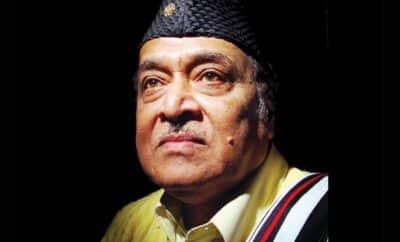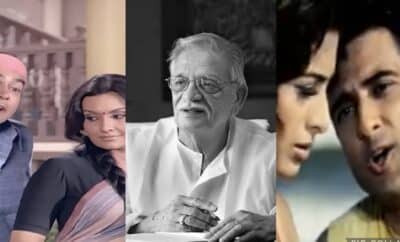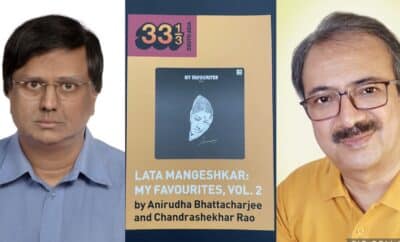Song Sketch
Ye Kaisi Ajab Dastaan Ho Gayi Hai – Rustom Sohrab – A Transpired Tale
Before the advent of playback singers in the mid 1940s, the music scenario in Hindi cinema was governed by several talented singer-actors. Amongst the female, the top 3 were Khurshid, Noor Jehan and Suraiyya. Also amongst these 3, it was only Suraiyya who stayed back in India after the partition and ruled the silver screen for some years. If Noor Jehan was Mallika-e-Tarannum, Suraiyya was Mallika-e-husn, Mallika-e-adakari and Mallika-e-tarannum. She became the highest paid artist of her time. She graced the screen and mesmerised the audience with her beauty and melodious voice at the same time. Her unconventional beauty satisfied the artistic eye. She mastered and immortalised Ghalib by singing his ghazals in Mirza Ghalib (1954). It is said that the then Prime Minister Pandit Jawaharlal Nehru told Suraiyya – “Tumne Mirza Ghalib ki rooh ko zinda kar diya”. Mirza Ghalib was the first film to be awarded the President’s medal. Talking about Suraiyya it will be an injustice if we don’t talk about her eyes!! They poured passion, holding a world within them.
Take her swan song from Rustom Sohrab (1963), for example.
Ye kaisi ajab dastaan ho gayi hai
Chhupaate chhupaate bayaan ho gayi hai….
The film is based on the 10th century epic Shahnameh by the Persian poet Ferdowsi. A tragic tale of Rustom (a legendary hero in Persian mythology) and his son Sohrab was directed by Vishram Bedekar who hailed from Vidarbha. Rustom (Prithviraj Kapoor) is one of the most powerful warriors of Iran. His reputation is spread far and wide. Princess Tehmina of Samangan (present day Afghanistan) becomes a witness to one such incident where Rustom with his strength picks up an entire tree fallen on the path. Tehmina (Suraiyya) loses her heart to not only his might but the pride and poise of this warrior. She gives an order to steal his beloved horse Rakhsh so that Rustom comes to Samangan to find him. When he arrives in Samangan, Rustom is greeted and invited by the King to be his guest. During his stay, he initially mistakes Tehmina, who visits his chamber to have a glimpse of him, as a kaneez (a slave girl) and orders her to sing. While Tehmina wants to hide her identity, she also wants to express her feelings for Rustom. And she says –
Ye dil ka dhadakna, ye nazron ka jhukna
Jigar mein jalan si, ye saanson ka rukna
Khuda jaane kya dastaan ho gayi hai
Chhupaate chhupaate bayaan ho gayi hai….
Though the film was a flop at the box office, its music by Sajjad Hussain was a sheer winner in aesthetic sense. It was one of the tail-ender films of his, that too after a gap of 8 years. Sajjad Hussain brought a beautiful Persian effect to the songs as the story belonged to the land of Persia. Qamar Jalalabadi has added the much needed charm to this song which is subtle and evocative. It still touches the heartstrings of the listener.
Bujha do bujha do
Bujha do sitaron ki shammein bujha do
Chhupa do chhupa do
Haseen chand ko bhi chhupa do
Yahan roshni mehman ho gayi hai….
Sajjad Hussain uses the harp, the mandolin, the guitar and the violins beautifully and the rhythm section has the piano, the tabla and the dholak. But it is the string instruments section which rules in the song. Sajjad Hussain’s son Mustafa has played the mandolin for this song. For those who are unaware, Sajjad Hussain’s sons were equally talented. Mustafa Sajjad began his career as a musician with C.Ramchandra and has been awarded the Dada Saheb Phalke award for his contribution as a Mandolin player.
Ilaahi yeh toofan hai kis balaa ka
Ke haathon se chhoota hai daaman haya ka
Khuda ki kasam aaj dil keh raha hai
Ki lut jaaun main naam lekar wafaa ka
Tamanna tadap kar jawan ho gayi hai…
What a wonderful expression of a toned down, soft desire for a person. It sounds more bewitching with Suraiyya singing and enacting it at the same time. Rustom (as well as the audience) gets absorbed in the vortex of her eyes while her voice hypnotises him. Her voice sounds like a well toned, dulcet sarangi. Meowing melodiously and giving the resonating echo effect. Communicating her desire through the words, her eyes reveal the transpired tale of her heart.



